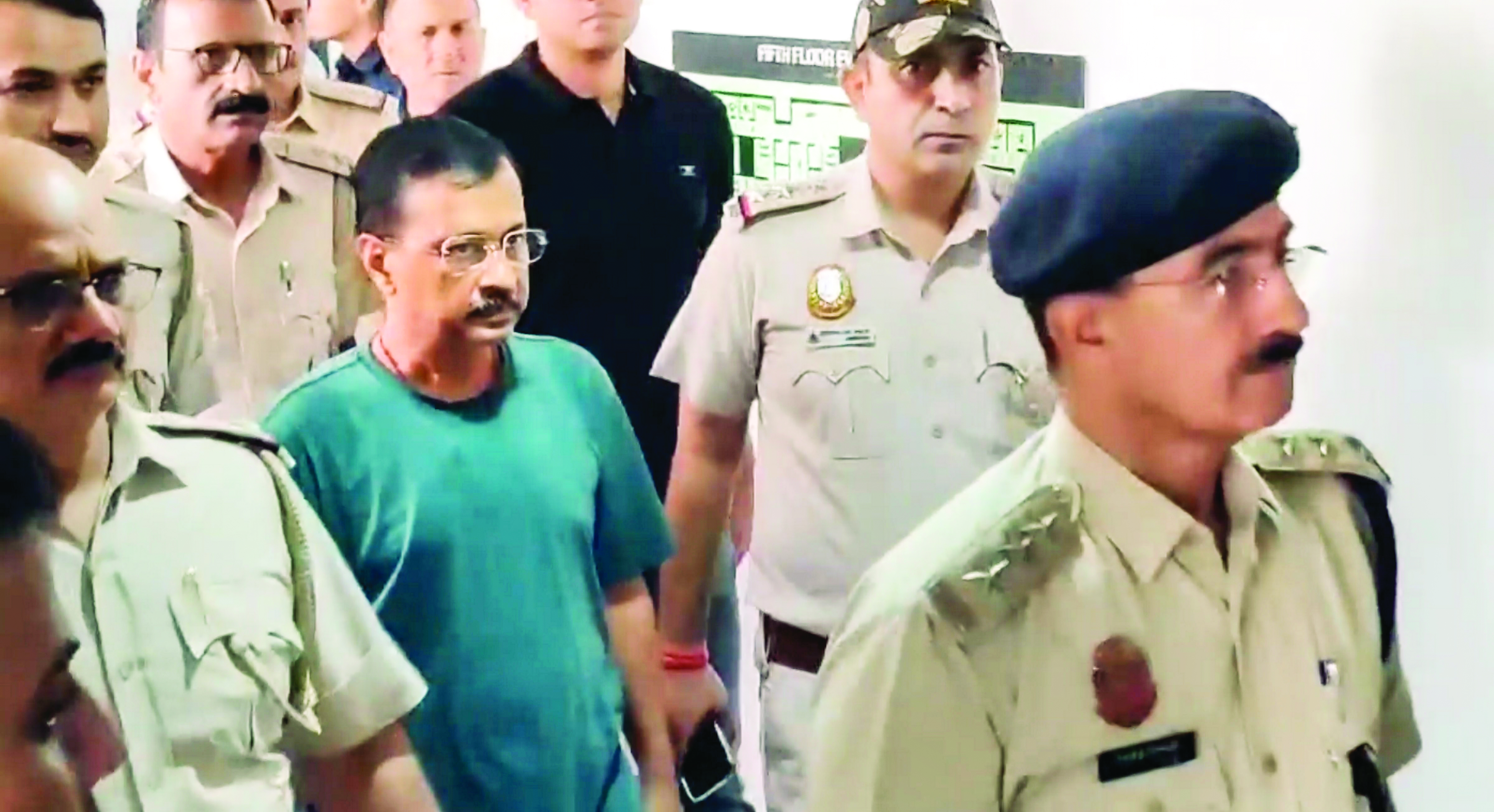After ED, CBI takes Kejriwal into custody; CM says he is innocent

NEW DELHI: In a series of mounting troubles for Delhi Chief Minister Arvind Kejriwal, the CBI arrested the Aam Aadmi Party (AAP) chief on Wednesday in connection with a corruption case linked to an alleged excise scam. Kejriwal, already in judicial custody due to an ED money laundering case related to the same scam, was subsequently sent to three days’ custody by a Delhi court.
During the hearing, Kejriwal maintained his innocence and personally addressed the court, denying allegations that he had blamed his former deputy Manish Sisodia for the liquor policy scandal, of which both are accused. He accused the CBI of sensationalising the issue, while the agency countered with accusations of baseless allegations.
The order was issued by Judge Amitabh Rawat of the Rouse Avenue Court after detailed hearings with both Kejriwal and the CBI.
Kejriwal’s formal arrest by the CBI earlier on Wednesday came after Judge Rawat refused to interfere with the ongoing investigation. The CBI, seeking five days of custody, cited the need for further interrogation regarding the alleged irregularities in the 2021–22 Delhi excise policy. Kejriwal was questioned by the CBI in Tihar jail on Tuesday.
During the court proceedings, Kejriwal, defending himself, asserted his innocence and that of other AAP leaders, including Manish Sisodia. He vehemently denied claims of shifting blame onto Sisodia, asserting: “It is being run in the media through CBI sources that I have given a statement putting my entire blame on Manish Sisodia. I have not given any such statement that Sisodia is guilty, or anyone else is guilty. I have said Sisodia is innocent, AAP is innocent, I am innocent. Their entire plan is to defame us in the media. Please record that all these have been run in the media through CBI sources.”
Judge Rawat acknowledged Kejriwal’s statements, affirming that Kejriwal had not made any declarations as claimed by the CBI. “I have read your statement. You have not said what the CBI has claimed about Sisodia,” the judge remarked.
Later in the day, the AAP strongly protested against the CBI’s misleading assertion regarding Kejriwal’s statement at court. Senior AAP leader Jasmine Shah accused the CBI of falsehood, specifically alleging that the agency falsely claimed Kejriwal had blamed Manish Sisodia. Shah emphasised: “The CBI has been caught lying outright in court. It’s unprecedented for a judge to highlight the lack of coherence between the CBI’s claims and its evidence. The investigation into Delhi’s alleged liquor scam has been ongoing for two years. AAP has consistently denounced the case as fabricated. The BJP is using CBI and ED to target AAP and detain CM Arvind Kejriwal unlawfully. We have repeatedly presented evidence of false testimonies used by CBI and ED to incarcerate AAP leaders.”
Kejriwal was initially arrested by the Enforcement Directorate (ED) on March 21, in a money laundering investigation tied to the alleged Delhi excise policy scam. Accusations suggest Kejriwal played a pivotal role in creating policy loopholes benefiting certain liquor vendors, with alleged kickbacks used to finance AAP’s election campaign in Goa. The case originated from a CBI complaint filed by Delhi Lieutenant Governor VK Saxena.
Following his arrest, Kejriwal was granted interim bail by the Supreme Court on May 10 to campaign for the Lok Sabha elections, returning to custody on June 2. The CBI, with court approval, recorded Kejriwal’s statement earlier this week while he was in Tihar jail.
On Wednesday, after a brief trial court hearing, the CBI formally arrested Kejriwal and proceeded to seek his custody from the Rouse Avenue Court.
The CBI’s counsel argued the necessity of custodial interrogation to probe deeper into the excise policy’s alleged discrepancies. Advocate DP Singh, representing the CBI, stated: “We need his custodial interrogation to confront him with documents. He has not been forthcoming in his answers.”
Kejriwal’s defence, led by senior advocate Vikram Chaudhari, contested the need for his arrest, questioning the timing and justification. “No new circumstances are warranting this arrest. This is an abuse of power,” Chaudhari contended, highlighting that Kejriwal had been granted bail recently and that no charges in the previous four chargesheets mentioned him directly.
The defence argued that the arrest was unnecessary and aimed at overreaching the Supreme Court’s interim bail order. Despite these objections, the court granted the CBI three days of custody to further their investigation.
Kejriwal will remain in CBI custody pending further investigation into the corruption allegations, with a maximum permissible period of 15 days. Should he fail to secure bail in either the corruption or money laundering cases, he faces a return to judicial custody after the conclusion of his current police custody.
The ED, meanwhile, informed the Supreme Court that the trial court judge rushed proceedings and denied the prosecutor a fair opportunity to contest Kejriwal’s bail in the money laundering
case. The federal agency criticised the trial court’s June 20 decision to grant regular bail to Kejriwal
as “perverse,” citing non-compliance with mandatory conditions under section 45 of the Prevention of Money Laundering Act (PMLA).
Justices Manoj Misra and SVN Bhatti, presiding over a vacation bench, acknowledged the ED’s response filed in Kejriwal’s plea challenging the Delhi High Court’s interim stay issued on June 21. They also permitted Kejriwal to withdraw his plea, following senior advocate Abhishek Singhvi’s statement that he intended to file a substantive appeal, given the high court’s final order on June 25 upholding the stay on the bail order.



